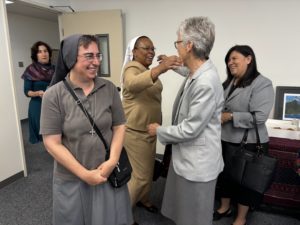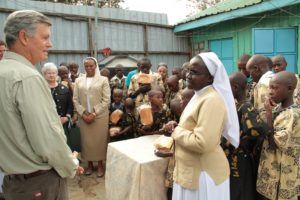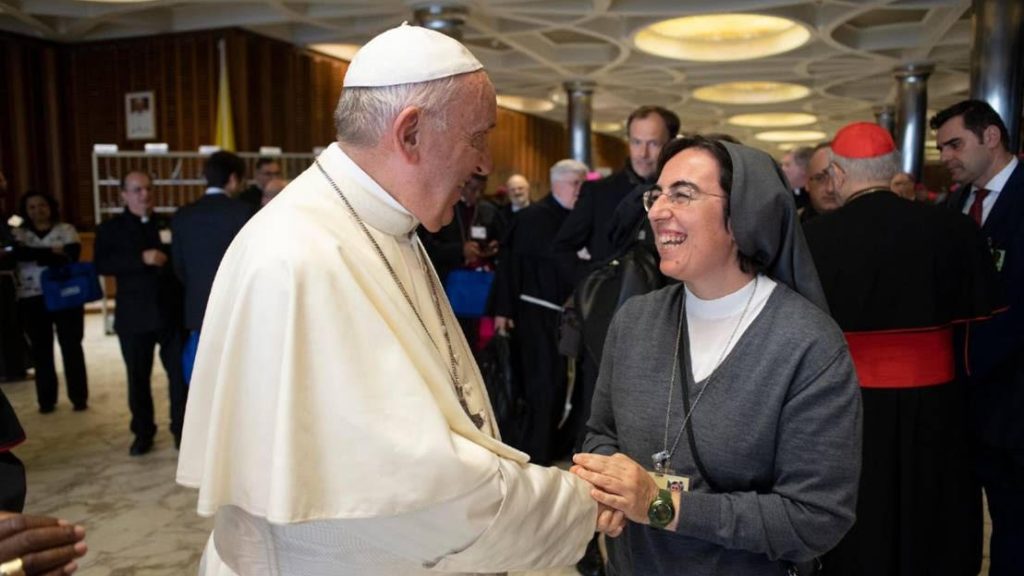With her simple gray habit, round glasses, and easy smile, 49-year-old Sister Alessandra Smerilli doesn’t look like most people’s idea of a “high-ranking Vatican official.”
What is it, then, that led Pope Francis to appoint the economist to several Vatican roles just a few years ago, before naming her to the highest post ever held by a woman at the Holy See?
The Salesian sister credits two factors with her surprising rise through the ranks: the work of the Holy Spirit, and the Conrad N. Hilton Foundation, known for its long-standing support of Catholic women religious globally.
Today, Smerilli serves as the No. 2 official at the Dicastery for Promoting Human Development, a recently revamped Vatican department that supports the pope’s social justice outreach in some of the world’s most troubled places. (She joins two other religious sisters appointed by Francis to high-ranking Vatican positions in recent years.)
In late August, the foundation invited Smerilli and three other leading Catholic sisters from different parts of the world to Los Angeles to update the board on projects coordinated by the foundation’s Catholic Sisters Initiative.
During a stop at the Cathedral of Our Lady of the Angels, Smerilli sat down for an interview with Angelus, sharing her thoughts about whether World War III is already underway, how she keeps the faith in a distressing job, and what’s behind Francis’ promotion of women to high-level Vatican positions.
Sister, your dicastery deals with the Church’s response to humanitarian crises around the world. That includes supporting the work of women religious helping the victims of “throwaway culture.” How can the Catholic Church better help them?
We are trying to run the Dicastery for Promoting Integral Human Development in a way that makes sure we can listen to the challenges and problems that the churches around the world are experiencing, trying to live out the words of Jesus in John 10:10: “I’ve come to bring life, and life in abundance.” That means life in abundance for everyone, no one excluded.
We see obstacles to abundant life all over the world. Everyone needs to do something to remove these obstacles. At the dicastery, we are trying to help people who are on the front lines. We are not at the front line — we can’t be, and it’s not our job.
That’s why it’s important to build networks. And sisters are part of these networks, working with dioceses, bishops’ conferences, and indigenous peoples. Because just as there are challenges in every part of the world, fortunately there are sisters all around the world, too.
For example, thanks to the Hilton Foundation, we developed a project within our dicastery for sisters in charge of pastoral care of migrants. It helped provide training and exchanges among them, connections between sisters and episcopal conferences in their respective countries that allowed us to build an international network of 500 sisters helping migrants.
When I was in Zambia last May at a Hilton Foundation meeting, I met one of these sisters and she has been appointed as the one responsible for pastoral care of migrants for the Zambia’s bishops’ conference.
The fact is that sometimes women are not recognized inside some of the systems of the institutional Church. So we’re trying to build these networks because the work of the sisters is so precious, and they need to be recognized in order to serve the mission and the poor better.

You’re an economist by training. How did you end up as No. 2 in a major Vatican department?
When Pope Francis established the Vatican COVID-19 Commission in 2020 to deal with the economic and social consequences of the pandemic, it received funding from FADICA (a Catholic philanthropy network), and in particular from the Hilton Foundation. The commission was then looking for a coordinator for its working group on the economy and Sister Jane Wakahiu, from the Hilton Foundation, suggested to those in charge of the dicastery: “Couldn't you find a religious sister for the job?” And she was told, “No, there are no sisters able to do this; we don’t know anyone.”
That forced them to look outside their circles, and so they found me and I was appointed to that job. I don’t know how, but then after one year Pope Francis appointed me as undersecretary of the dicastery and later as secretary. So this is the way in which the Holy Spirit works, but in some way, some people are helping him!
As an economist, you understand a lot of the complexities involving global conflicts better than others. What do you see as the biggest problem, or the biggest need, facing the world right now?
We want to be at the service of the entire Church, which means being at the service of the entire world. And we see every day that the challenges, the sorrows around the world are so many. The ones we see in the news are just a tiny part of what is going on.
There are hidden conflicts, and there are issues that are forgotten issues all around the world. So we’re trying to reorganize the dicastery, and in this reorganization we have a new section called “Listening and dialogue” that’s in charge of being in touch with different parts of the world, to listen, and trying to understand what is going on. And to see if we can do something with them.
There are times we receive very sad news but cannot share publicly, because they are related to sensitive issues, often political issues. And I wish we could. Sometimes, it’s too much.
We do try to make sure there is someone listening so that people don’t feel they are forgotten; to be in dialogue with the ones who feel they are not listened to.

In a recent meeting with a group of legislators, Pope Francis repeated something he’s said before: that World War III is already underway, that it’s being “fought piecemeal.” From where you see things, would you agree with that assessment?
Yes. We see it. As I was saying before, there are many hidden conflicts around the world. For example, in Africa, we’re accompanying a group of bishops dealing with conflicts related to the extraction and exploitation of natural resources.
With all these conflicts in which people are dying around the world, it seems as though the world is on fire. So we need to do our best in order to understand what’s going on, and to help people that have to stay there in the middle of conflicts and try to see what we can do.
Sometimes all we can do is pray, and make sure that their needs are brought to the attention of the Vatican’s Secretariat of State and of the Holy Father.
With all those sufferings you learn about around the world, as well as with the challenges and problems in the Vatican itself, how do you personally keep your faith?
I think my faith has actually been strengthened. Since I began this job at the Vatican, I’ve realized that there are so many challenges facing the Church that I need to spend more time in prayer and meditation. Otherwise, I won’t be able to go to sleep or not have nightmares. This job makes me pray more!
Also, this is strengthening my faith because it makes me feel that I’m just a drop in the ocean. And so you have to rely on the Holy Spirit, on God, and say: OK, you’re in charge. I’m just helping.
Pope Francis has gotten a lot of attention for elevating women like yourself to leadership roles in the Holy See. But it hasn’t stopped the secular media from speculating about the possibility of ordaining women, even though Pope Francis so many times has said that the worst thing the Church can do is “clericalize” women. What do you make of all that excitement and speculation?
I completely agree with Pope Francis, and even if he didn’t say this, I would still say it: We don't need to clericalize. Because there are many vocations inside the Catholic Church. Being a priest is one of those vocations, but it’s not the vocation that you need to have in order to “be in charge” and have responsibilities.
What Pope Francis is doing is trying to make people understand that you don’t need to be a priest in order to share in the governance of the Church. I strongly believe that we [women] are not there to occupy a space, but we need both men and women in order to have a more complete picture and a different perspective on the reality we face. And I hope this will continue.

